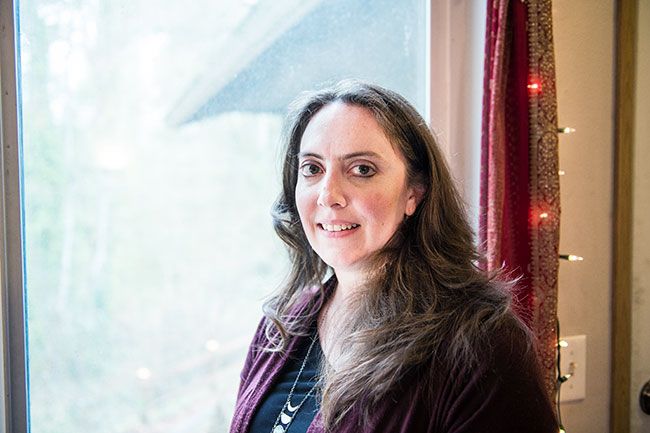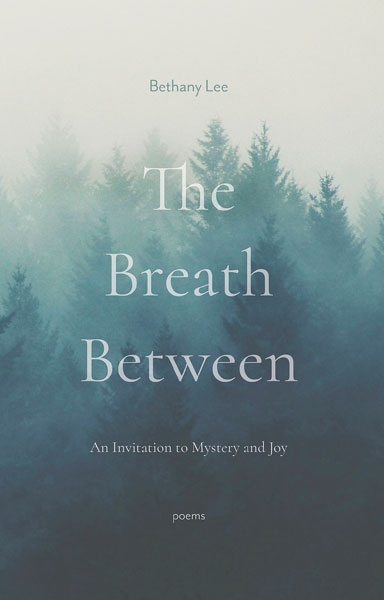Stopping By: Rhythm of music, rhythm of words
Lafayette writer Bethany Lee’s poetry is influenced by rhythms and sound.
The rhythm of music. The rhythm of the waves and the sound of the wind. The sound of feedback from her first readers and of conversations with fellow writers about their shared craft.
The latter, especially, has been important since she decided that writing is something she needs to do, not just wants to do.
“I’m more myself when I’m doing this work,” said Lee, who didn’t write seriously until she was an adult.
Now she’s on the brink of publishing her first book, “The Breath Between, an Invitation to Mystery and Joy.” The book launch event will run from 3 to 5 p.m. Saturday, May 18, in the Newberg Public Library.
“If I didn’t write,” she said, “I wouldn’t know who I am.”
Lee also feels defined by her first trade, music, something she started long before she realized it would influence her writing.
“I don’t think I’d be a poet without music,” she said.
She learned music as a child growing up in Canby. Both her parents played keyboards and other instruments. That meant “learning to play piano was non-negotiable,” she said.
Today, she is a choral accompanist who plays piano with choirs at McMinnville High School, those at the middle and elementary schools, and other local groups, such as the McMinnville Women’s Choir.
She enjoys working with groups, especially those made up of children. And, she said, “if I can make singers better, I win.”
A certified music practitioner, she also plays the harp for hospice patients and people who are hospitalized. Her work isn’t music therapy, she said; rather, she provides therapeutic music at important times in the life cycle.
“I go in without a lot of agenda and work with what’s present at the moment,” she said. A man recovering from surgery may be comforted by background music, for instance. Or the music may help a dying woman relax and focus on her family, rather than on pain.
She’d known for many years that she wanted to work with hospice patients, who are reaching the end of their lives. Therapeutic music combined that interest with her music skills — in fact, the longtime pianist learned to play the harp just so she could use it for therapy.
“It’s really life-giving for me,” she said. “We all want to do something meaningful; this is meaningful for me.”
While she doesn’t play in order to feed her poetic muse, she said, the meaning she finds does affect her poetry. “I don’t do it for the inspiration, but how can it not inspire me?” she asked.
Her family also is a big influence.
She and her husband have two daughters, one a freshman in college and the other a senior at McMinnville High School, where she studies in the Engineering and Aerospace Sciences Academy. Her husband helps coach their younger daughter’s robotics team.
When the girls were in middle school, the Lees decided to spend a year at sea in a sailboat.
“We wanted to give our kids the experience, so we learned to sail on the Columbia, then took off,” Lee said.
Of course, the trip gave her experiences, too, providing fodder for a blog while they were still sailing and notes that, five years later, she’s working on turning into a book.
The year at sea also is reflected in some of her poetry, she said — if not directly, then through the way it caused her to appreciate self-sufficiency and going with the flow.
“I learned to be kind when things are hard; that uncertainty is not the worst thing; that you meet people and new friends all the time.”
Six months after the family returned to dry land, Lee gathered up her blog and began to turn the posts into a book.
Her husband suggested she start fresh, using the blog as notes rather than simply compiling its entries.
She resisted. “So much work,” she thought.
But when she tried it his way, she discovered he was right.
The writing group she often attends also influenced her efforts. It helped her decide to start with the harrowing tale of crossing the Columbia River bar at the start of their trip. They almost lost the mast in the turbulent waters, she said.
The sailing memoir was coming along. In early 2018, Lee plotted out her calendar, planning to devote much of the summer to finishing.
Her plans were interrupted, though, when a publisher offered her a contract for a book of poetry.
It was the kind of interruption about which every writer dreams.
Lee had written a few pieces for Barclay Press in Newberg. Not long after Barclay launched a poetry imprint, Fernwood Press, she bumped into the editor at a conference.
Friends already, they talked about their writing. She mentioned that her poetry was “beginning to pile up” — a casual remark, not a sales pitch, she said.
But the next time they talked, he said, “I’d love to publish your poetry.”
She sent him some samples, signed a contract, and set to work.
“It was a new process for me,” having a deadline established by the contract rather than writing when she felt moved to, she said. She already was committed to writing that summer, though, so she just shifted her focus from her sailing book to her poetry.
She was ready to write poems, she said, especially since she’d recently taken a class with Kim Stafford, Oregon’s poet laureate. “I felt some really fabulous things were coming out,” she said.
The class also helped her establish a working relationship with Stafford. She has accompanied him at his poetry readings, such as the one at the McMinnville Public Library last Thursday.
“Once I turned the poetry spigot on, it was hard to turn it off,” she said.
Happily, she said, “the well hasn’t dried up.”
While Lee writes both poetry and prose, she said she finds them quite different.
She has “never been comfortable with fiction,” she said. She prefers reality, choosing nonfiction prose subjects and including factual details in her poems.
“I love writing nonfiction,” she said. “It’s fun to try to make it clear in a simple way.”
In the sailing blog, and even more so in the book she’s writing about the trip, she said she endeavors to “bring the world of living at sea to life and take everybody along.”
Writing prose is more cerebral, she said, while poetry comes from her soul, rather than her head. Poems often begin with wondering and questioning, she added.
Before she set to work on her book of poetry, Lee said, she hadn’t established a daily writing routine. But now she tried to write every day, sometimes setting goals for number of words in a day or the number of poems in a week.
“I learned to go to that poetry place in my mind on demand,” said Lee, who records her poetry with a fountain pen.
If she became stuck, she said, she let herself free write — sort of like doodling with words — until a question arose. She wrote with abandon, then edited her rough draft, repairing rhythms and changing words at times.
She sent each new poem to a pair of trusted, longtime friends for critiques. “Their responses often helped me in hearing my own voice,” she said.
With her close friends or in a writing group, she said, it’s important to consider criticism a tool for improvement. “Look at what’s strong, what’s working,” she suggested. “It’s not bad; maybe it’s just not done yet.”
Terroir and other influences
She compared it to sailing, another activity she fell for as an adult. “It’s more about the journey than the destination,” she said. And as she worked at improving her writing, or her sailing skills, “you learn and have fun along the way.”
Lee, who writes both poetry and prose, joined a writing group in Portland as she began to hone her craft. She has taken part in several writing retreats with them.
In 2010, she signed up for the first Terroir Yamhill County Writing Festival, in part because it was nearby.
When she walked into the McMinnville Community Center for the event, “I had the feeling I didn’t belong,” she said. She assumed, erroneously, that everyone else had more experience and skill -- “writing cred” — than she did.
“I had to talk myself into it,” she said.
But as the Terroir workshops and readings wore on, she realized that Terroir was for everyone, writers and would-be writers and readers, of all skill levels. Some just loved writing; some had published books already.
She sat down in a workshop given by Portland author Brian Doyle. Although she had yet to read “Mink River” or his other books, but she was struck by his enthusiasm and encouragement to less experienced writers.
“What a gift,” she said, recalling the late author’s Terroir workshop.
“Hearing Brian Doyle felt really formative for me,” she said. “He left a real spark ... for me, it was a move forward and an affirmed path.”
Doyle asked workshop participants to write something based on his prompt, “altar.” In the few minutes alloted, Lee dashed off a poem.
“I liked what I did,” she said. “I’m still happy with it.”
In fact, she said, it’s one of about 50 poems in her forthcoming book.
During that first Terroir, Lee also found encouragement in an open mic presentation by Ellen Summerfield. She talked with the published poet during a break in the conference.
“I was a fangirl,” Lee said, remembering how Summerfield’s work resonated with her.
Summerfield even read one of Lee’s poems. “She offered such generous affirmation,” Lee recalled. “She was so gracious, when I wasn’t even sure I belonged.”
Lee treasures the experiences with Summerfield, Doyle and others she’s met at subsequent Terroir events. It reminds her of the value of sharing with and supporting her fellow writers.
“I’ve found my strongest voice when I have community around me,” she said, noting that discussing work with other writers helps her overcome the “inner editor” that may try to tell her she’s not good enough.
“Terroir nurtures conversation” with writing colleagues, she said.
Lee plans to attend the 2019 Terroir, scheduled April 20. The 10th anniversary edition of the event already is sold out.
Starla Pointer, who believes everyone has an interesting story to tell, has been writing the weekly “Stopping By” column since 1996. She’s always looking for suggestions. Contact her at 503-687-1263 or spointer@newsregister.com.













Comments